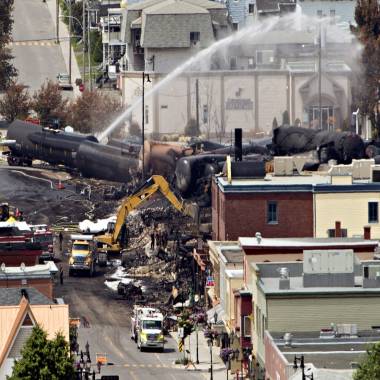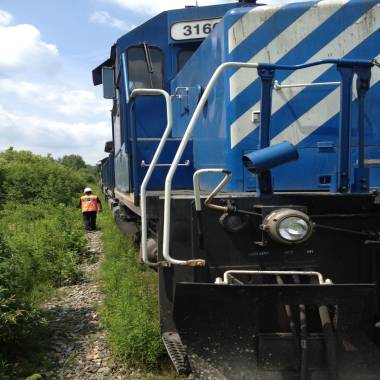Searchers are on the hunt for those who are still missing after an oil train derailed in Quebec, killing at least 15 people.
By M. Alex Johnson, Staff Writer, NBC News
Canadian safety investigators said Tuesday there's no evidence that the derailed oil train that flattened a small Quebec town was sabotaged.
Two more bodies were found Tuesday, raising the death toll to 15 after the runaway train carrying crude oil slipped from its moorings early Saturday, speeded almost 7 miles down a steep grade, derailed and exploded in the town of Lac-M?gantic.
About three dozen other people remained unaccounted for.
Authorities said the cause of the incident still wasn't known, but they contested the assertion of Ed Burkhardt, chairman of the parent company of Montreal, Maine & Atlantic, the railway that operated the train, that "we have evidence" that it had been tampered with.
Quebec police Capt. Michel Forget said Tuesday that police had "discovered elements" that had led them open a criminal investigation. He said terrorism wasn't suspected and cautioned that "criminal negligence might be one of the leads we are looking at," as opposed to sabotage or active tampering.

Ryan Remiorz / The Canadian Press via AP
Searchers dig through the rubble for victims of the inferno in Lac-Megantic, Quebec, on Monday.
Authorities announced the criminal probe Monday, saying more than 100 officers were involved.
Ed Belkaloul, manager of eastern rail operations for the Canadian Transportation Safety Board, also said at a news conference Tuesday that investigators had no evidence of sabotage and added that Burkhardt's company hadn't offered them any. Transportation authorities said Monday that the locomotive suspected of causing the derailment had been inspected just the day before the incident, on Friday, and was found to have no defects.
For the first time, TSB investigators gave a broad timeline of events overnight Friday and early Saturday.
The train, comprising 73 rail cars, all but one of them carrying crude oil, was parked for the night in the town of Nantes when a fire was reported shortly before midnight, TSB investigator Donald Ross said at a briefing for reporters. He said firefighters extinguished the blaze.
That fire is the focus of a dispute between the railway and investigators. Burkhardt said firefighters might have been responsible because they shut down the locomotive to put out the fire ? and possibly turned off the brakes.
But Patrick Lambert, the Nantes fire chief, told The Globe and Mail of Toronto that his crew was following standard procedures dictated by Montreal, Maine & Atlantic and was told it could leave the scene by the railway. He angrily said he would "clear this all up" in the next few days.
What isn't in dispute is that by shortly before 1 a.m., the fire crew and a railway employee who had responded to the fire had left the scene. That's when the train is believed to have started rolling downhill about 7 miles toward Lac-M?gantic.
The slope of the track along that stretch is about 1.2 percent ? which is relatively steep ? and the train eventually raced well past the authorized speed limit, Ross said.?At some point, "the locomotive detached from the rest of the train and carried through the rest of the town and out the other side, approximately six-tenths of a mile," he said.

Transportation Safety Board of Canada / handout
Handout image released Monday by the Transportation Safety Board of Canada showing an investigator looking over a locomotive in the train involved in the derailment and fire in Lac M?gantic.
Rail dispatch crews had no notice that the potential fireball was hurtling toward Lac-M?gantic because the train was traveling along a secondary line ? that is, not one of major lines that serve cities like Montreal ? and had no warning system.
"This area is not equipped with the type of signal systems that would even show to a rail traffic controller that something was moving on the territory that they hadn't authorized," Ross said.
Evacuees returning home
The white-hot fire continued burning through the weekend, forcing the evacuations of about 2,000 area residents and hampering investigators' access to the scene.
The fire was finally declared under control Tuesday, and about 1,200 residents of two neighborhoods were being allowed to return home.
The remaining 800 or so were still prohibited from returning home because they live in or near the center of town, the area hardest hit by the explosions, the Canadian Broadcasting Corp. reported.
"It's tough, but we'll live through it," Denis Couture, one of those allowed to go home, told The Montreal Gazette.
Ticking off the names of business that had been destroyed, he said: "We'll rebuild. There'll be another Dollarama. There'll be another Musi-Cafe bar. You just wait and see.
"We'll never replace what was there, but we will rebuild, and we'll keep on living."
Related:
This story was originally published on Tue Jul 9, 2013 7:49 PM EDT
projectglass stock act new york auto show khalid sheikh mohammed masters par 3 gwen stefani overeem
No comments:
Post a Comment
Note: Only a member of this blog may post a comment.